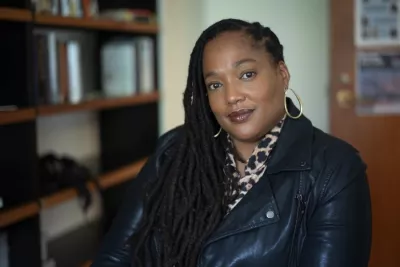Nina Johnson
Associate Professor of Sociology
Department Chair, Sociology & Anthropology
Sociology & Anthropology-Sociology
Black Studies
Peace & Conflict Studies
Contact
Affiliations: Lang Center, Peace & Conflict Studies, Sociology & Anthropology, Black Studies , Mellon Mays

Education
Ph.D, Sociology, Northwestern University, 2012
M.A., Sociology, Northwestern University, 2007
M.A., Culture and Communications, Steinhardt School of Education, New York University, 1999
B.A., Urban Studies and African American Studies, University of Pennsylvania 1997
Selected Publications and Activities
Teaching and Research Interests
Politics, Culture, Race, Class, Mobility, Inequality, Cities, Carceral Policy, Qualitative Methods
Courses and Seminars Taught
- Introduction to Black Studies (BLST 015)
- Foundations: Self, Culture, and Society (SOCI 001)
- Introduction to Race and Ethnicity (SOCI 007B)
- Black Liberation (SOCI/BLST 028)
- Black Social and Political Thought SOCI 048G/ BLST 040G)
- Race and Place: A Philadelphia Story (SOCI 048I)
- Political Sociology: The Mafia and the State (SOCI 048K)
- Urban Crime and Punishment (SOCI 048L)
- Black Feminisms (SOCI 058B)
- The Housing Crisis in America (SOCI 058C)
- Du Bois and the Color Line (SOCI 138)
- Advanced Topics in Political Sociology: Power, Governance, and the State (SOCI 148)
Nina Johnson is an Associate Professor in the Department of Sociology and Anthropology and the Program in Black Studies at Swarthmore College. Consistent with her training in Urban Studies, African-American Studies, and Culture and Communication, her research interests lie in the areas of inequality, politics, race, space, class, culture, stratification and mobility. She has recently published papers on political issues relative to black experiences of upward mobility and ruminations on a sociology of Black Liberation and contributed to a documentary (Turning A Corner, Beyondmedia Productions) on the legal, economic, and social barriers to exiting street level sex work. She has presented work on the representations of race, class and place in mid century black novels, including the work of James Baldwin, Richard Wright, and Zora Neale Hurston and a community video project on the impact of Islam on black religious, social and political life in Philadelphia and the Delaware Valley. Her book project revisits the classic works of W.E.B. Du Bois and E. Franklin Frazier and considers meaning making processes among the black elite, its relationship to the larger black population, and its role in any projects of collective racial advancement. Her current research is a multi-method study of the impacts of mass incarceration at the neighborhood level, which is complemented by her teaching in State Correctional Institutions in Pennsylvania. She is a member of both the Graterford and Chester Think Tanks, two communities of scholars who work on issues related to the criminal legal system and provide opportunities for engagement across the physical and social barriers that prisons create.
She wholeheartedly endorses every word of James Baldwin, but finds the following particularly prescient in shaping and informing her work, “The time has come, God knows, for us to examine ourselves, but we can only do this if we are willing to free ourselves of the myth of America and try to find out what is really happening here.”



